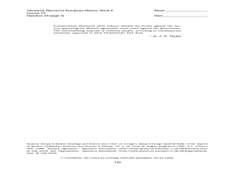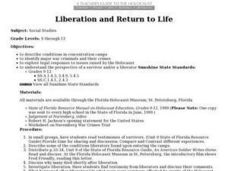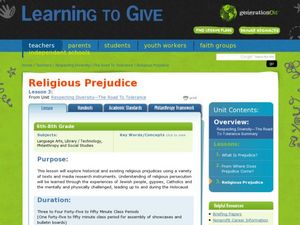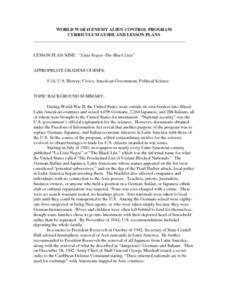Curated OER
Should US Officials & Health Professionals be Investigated for War Crimes?
Students explore ethical issues. In this human rights lesson, students read articles and documents related to torture used in government investigations and if medical ethical guidelines were adhered to. Students respond to discussion...
Echoes & Reflections
Perpetrators, Collaborators, and Bystanders
After the Holocaust, the world grappled with how to bring justice to the Nazis. But what to do with the thousands—if not millions—who allowed it to happen? Young historians consider the issues of guilt, collaboration, and responsibility...
Curated OER
Do We Need a Permanenet International Criminal Court?: War Crimes, Violence, International Law and Politics, Nuremberg
For this lesson, students explore the history, relevance and current application of international tribunals for war crimes. Students look at cases from the Nuremberg trials, Tokyo trials and the Bosnian War.
Curated OER
Prisoners in Another War
Learners identify violations of the Geneva Convention in video clips. They discover the role of international bodies in dealing with war crimes. They read primary source documents as well.
Echoes & Reflections
Studying The Holocaust
While many young scholars are familiar with the Holocaust, they may not understand the specific history that led to the unprecedented atrocity. The first lesson in the unit helps teachers gauge their pupils' background knowledge. A...
Echoes & Reflections
The "Final Solution"
Nazi policies shifted from deportation and imprisonment to extermination of the Jewish people in death camps in the "Final Solution." Learners examine photos of artifacts, read poetry written by survivors, analyze testimony from...
Constitutional Rights Foundation
U.S. Immigration Policy and Hitler’s Holocaust
Though the Statue of Liberty welcomes political refugees to her shores, the welcoming sentiment has not always been reflected in the American citizenry. High schoolers read about the regrettable period in United States history...
Facing History and Ourselves
Analyzing Historical Evidence
High schoolers examine World War I war crimes. In this world history instructional activity, learners use primary and secondary sources to research and understand the systematic nature of the Armenian Genocide. High schoolers reflect on...
Curated OER
Genocide in World War II
High schoolers access a variety of websites that explore the Nazi German genocide of Jews in WWII. They view a film, complete a worksheet and write an opinion paper supporting the view to either punish or forgive the perpetrators of...
Facing History and Ourselves
Justice After the Holocaust
Though there could be no true justice for the horrors of the Holocaust, many of those responsible for crimes against humanity were found guilty in the eyes of the law. Using primary and secondary sources in the 16th installment of a...
Lesson Snips
Lessons from the Holocaust
Connect global examples of attempted genocide with a well-designed social studies lesson. It includes an excellent informational text with background information on the Holocaust, as well as worksheets, book report guidelines, and...
Digital History
Compensation for Slavery
Should Americans provide compensation to those whose ancestors suffered from slavery? Read and analyze the arguments of two modern-day journalists on the topic. Then, have a discussion on both the merits of the arguments as well as what...
Curated OER
Munich: Peace in Our Time
Students examine the Munich Agreement. In this World War II lesson, students analyze the agreement made among Germany, the United Kingdom, France, and Italy. Students discuss the strengths and weaknesses of the agreement.
Curated OER
Should Hate Be Outlawed?
Students investigate hate crime legislation. In this hate crime activity, students examine the St. Paul city ordinance that outlawed hate crimes. Students explore the fine between hate crime legislation and First Amendment rights.
Curated OER
Lincoln and the "Writ of Liberty"
Learners debate and explore the rationale and ethics behind Lincoln's 19th century suspension of habeas corpus - the 'writ of liberty' and answer related questions.
Curated OER
Liberation and Return to Life
Students read testimonies of Holocaust survivors, describe conditions liberators found upon entering camps, investigate liberation, and research background of the Office of Special Investigations and Nuremberg War Crimes Trials.
Curated OER
Genocide: Past & Present
Students visit the Holocaust Musuem through an interactive program. They examine Hitler's Final Solution and where concentration camps were located. They analyze how the situations in Auschwitz are similiar to Darfur.
Curated OER
Anna's Dilemma
Students read a scenerio about people who lived in Germany during Nazi rule. As a class, they discuss the situations the character finds herself in and identify her responsiblities to her family. They answer discussion questions and...
Curated OER
Respecting Diversity- The Road to Tolerance
Students use a graphic organizer to find similarities and differences in three religions. In this prejudice activity, students understand the events leading up to the holocaust. Students understand that people who respected diversity...
Curated OER
Bioethics of Eugenics
Students research and discuss the ethical aspects of Nazi racial ideology, including sterilization, marriage prohibitions, and euthanasia. They develop codes of ethics regarding reproductive rights, euthanasia, and the death penalty.
Curated OER
"Lista Negra-The Black Lists"
Students review the history and political motivation behind the U.S. adoption of the Monroe Doctrine and how national security measures collide with the issues of due process and human rights during times of war. They learn about how the...
Curated OER
Freedom from Oppression
Students investigate instances of genocide and role play as reporters writing news stories and editorials.
Curated OER
Toilet Paper
In this reading comprehension worksheet, students read a 4-paragraph article titled "Toilet Paper" and respond to 8 multiple choice questions and 7 short answer questions.
Curated OER
The Holocaust
In this social studies worksheet, students read the story of the Holocaust and focus upon the outcome for the survivors. The students could write a summary.

























